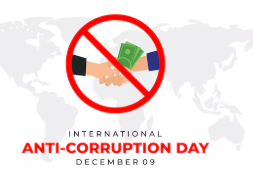International Anti-Corruption Day Observed on December 09
International Anti-Corruption Day is observed on December 9th and aims to raise awareness about corruption globally. In India, corruption remains an issue, which affects both the public and private sectors. Key forms include bribery, nepotism, and embezzlement. Corruption hampers economic growth and erodes trust in institutions.
Legal Frameworks
The Right to Information Act (RTI) was enacted in 2005, which empowers citizens to request information from government entities. This law enhances transparency and helps expose corruption. The Goods and Services Tax (GST) was introduced in 2017. It simplifies the tax structure and reduces tax evasion opportunities.
The Prevention of Corruption (Amendment) Act was passed in 2018. This law imposes stricter penalties on corrupt officials. It also criminalizes bribery and holds corporations accountable.
Digital Initiatives
Digitalisation has transformed government services. E-Governance reduces corruption opportunities . Citizens can now access essential services online. This shift minimises reliance on middlemen and curtails bribery.
Anti-Corruption Agencies
India has several key agencies to combat corruption. The Central Bureau of Investigation (CBI) and the Enforcement Directorate (ED) investigate corruption cases. The Lokpal also plays important role in addressing corruption. However, political interference often hinders their effectiveness.
National Strategies
The National Anti-Corruption Strategy promotes comprehensive action, which focuses on public awareness and institutional strengthening. International cooperation is also encouraged to combat corruption.
Despite these measures, challenges persist in the fight against corruption. Resistance from officials and systemic issues remain prevalent. Nonetheless, ongoing efforts reflect a commitment to encouraging transparency and accountability in India.
GKToday Facts for Exams:
- RTI (Right to Information) Act: Enacted in 2005, RTI empowers citizens to request information from government bodies. It enhances transparency and helps expose corruption, despite challenges from reluctant officials.
- GST (Goods and Services Tax): Introduced in 2017, GST simplified India’s tax structure. It connects businesses online, reducing opportunities for bribery and tax evasion, thereby promoting a more transparent economy.
- Lokpal: The Lokpal is an anti-corruption ombudsman in India. It addresses corruption complaints against public officials. However, its effectiveness is often hampered by political interference and systemic issues.
- National Anti-Corruption Strategy: This strategy promotes comprehensive anti-corruption actions. It focuses on public awareness and institutional strengthening. International cooperation is encouraged to enhance the fight against corruption.
Month: Current Affairs - December, 2024
Category: Legal & Constitution Current Affairs


